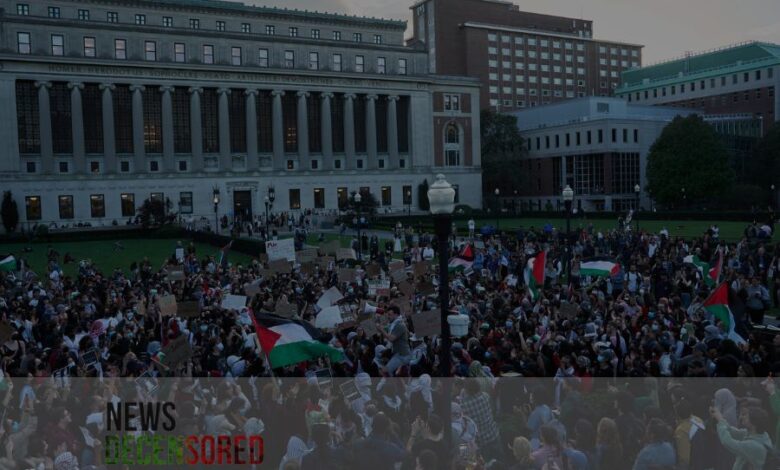Uproar on College Campuses: Pro-Palestine Protests Spark Turmoil and Deep Divisions

Universities across the United States are grappling with a wave of pro-Palestinian protests that have ignited tensions, sparked accusations of antisemitism, and resulted in campus lockdowns and arrests. Columbia University in New York City is at the storm’s center, where a vocal student movement has clashed with the administration and security forces.
Columbia in Crisis
Columbia has become the epicenter of the campus protests. Tensions escalated rapidly as Passover approached, a prominent Jewish holiday. The university, citing safety concerns, switched all classes to a hybrid model for the remainder of the semester. This decision came after days of protests, including the erection of an encampment by pro-Palestinian students. The encampment faced criticism for attracting non-affiliated individuals who allegedly engaged in disruptive behavior and antisemitic rhetoric.
Escalating Tensions and Security Concerns
The turmoil at Columbia has drawn national attention. Jewish students, fearing for their safety, reported harassment and intimidation. A prominent rabbi advised Jewish students to return home for Passover. This further fueled the controversy, highlighting the deep divisions on campus.
Beyond Columbia: Protests Spread
Solidarity protests with Columbia erupted at other universities, including Yale and NYU. These protests also saw clashes between pro-Palestinian and pro-Israeli groups, leading to arrests at Yale. The demonstrations have reignited debates about free speech, academic freedom, and the role of universities in addressing the Israeli-Palestinian conflict.
Demands and Divides
Protesters are calling on universities to divest from companies they believe profit from the Israeli-Palestinian conflict. However, the methods and rhetoric used by some groups have been criticized for being inflammatory and antisemitic.
University Leaders Under Pressure
University presidents are facing immense pressure to navigate this complex situation. Columbia’s president, Minouche Shafik, has been criticized by both sides. Some denounce her handling of the protests, while others condemn her decision to call in police. She has faced calls for resignation and threats of financial repercussions from donors.
A National Conversation
The campus protests reflect a broader national conversation about the Israeli-Palestinian conflict. The recent escalation in violence, particularly the attack on Gaza by Hamas, has heightened emotions and drawn renewed attention to the long-standing issues.
Moving Forward: Finding a Resolution
Universities face a daunting task in fostering open dialogue and understanding while ensuring the safety of all students. This requires a multi-pronged approach, including open communication with students, faculty, and the broader community. Efforts are needed to address antisemitism and protect Jewish students while also allowing for respectful discussion of the Israeli-Palestinian conflict.
The future of these campus protests remains uncertain. However, one thing is clear: they have exposed deep divisions within universities and American society. Finding a path forward requires a genuine commitment to dialogue, respect, and a willingness to find common ground.




